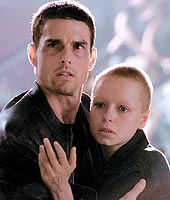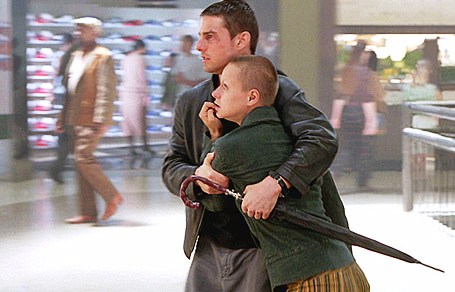
In Minority Report, director Stephen Spielberg uses cinema to bring the visions of short story author Phillip K. Dick to life. First published in 1956, Dick’s intense and what are considered by many to be somewhat paranoid scenes – which in my personal opinion, were heavily influenced by the era they were written in (ie: Cold War, Russian enemies, American hysteria) – question whether or not human beings are predisposed to commit crimes or if they have the free will to change their outcomes.
Spielberg expands on Dick’s writings to create a world where human beings are predisposed to fearing their government. Their arrests are caused by actions that have been foreseen by government “forces” – most of the population remaining in the dark about the existence of Pre-Cogs – and, as such, create the ideology that the government knows all. I first saw this film at its original release (December 2002) and understood the basic concepts, but did not harbor the knowledge I do now to contrast the differences between the imaginary world of Phillip K. Dick and the world we live in. Today, I have to ask myself whether or not he was on to something.
To be honest, I think Spielberg created a world that is not too far off from reality – both his and Dick’s. In Lester D. Friedman’s article Minority Report: A Dystopic Vision, he explains the accidental yet perfect timing of the film’s release. While written before the September 11th terrorist attacks, Minority Report was released at a time where Americans constantly questioned the extent of their safety, security and their personal information. He also explores the importance of maintaining essential human freedoms so they are not exchanged for so-called “governmental assurances.”
In his article Friedman says, “…Can we trust the FBI and the CIA to exercise appropriate restraints, to monitor only those who endanger our safety and not those who hold unpopular opinions, if given greater power to patrol our lives? Will President Bush's and Tom Ridge's Department of Homeland Security prevent violent activities or routinely engage in unjustified surveillance of our personal lives? Does the former justify the latter? It is also a time when, while ethicists debate the ramifications of the latest scientific findings about genetic predispositions, prisons throughout the United States contain people arrested because the government suspects they would have committed future crimes.”
In short, we currently live in a world where the slightest suspicions that would, under normal circumstances, would remain just so, contain enough “evidence” to lead to conviction and life-altering damages. We have also lived through a state of panic similar to the environment Americans were subdued to during the Cold War (unless you find S.W.A.T. teams searching mailboxes for anthrax any different than the duck-and-cover drills elementary schools students memorized, the idea being ensuring safety and knowing what you can do to deter oneself from danger) . The combination of Dick’s fears and Spielberg’s vision provides illusions to the fact that the media and the government are long time acquaintances. I find it ironic and chilling that the media follows a timeline where current events can coincide with our entertainment with such ease.
















